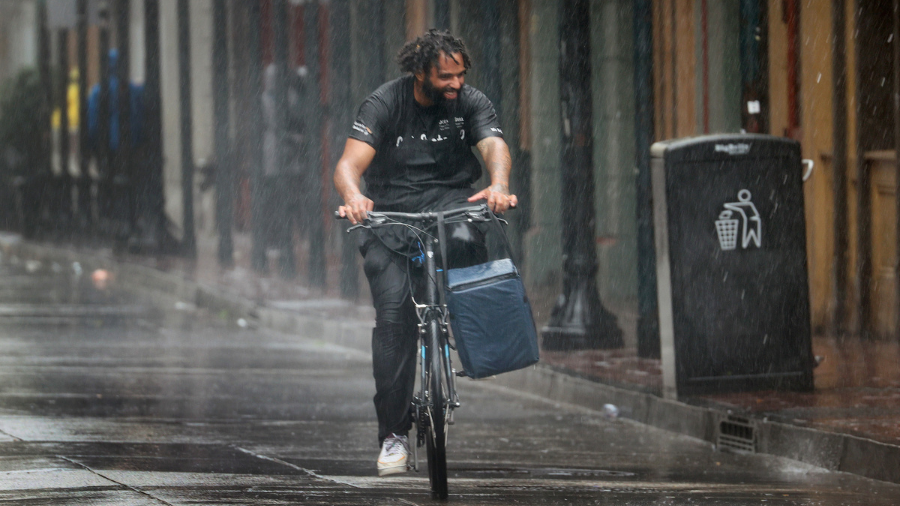Seattle, WA
Seattle gave low-income residents $500 monthly payments with no strings attached. Some got new housing and employment rates nearly doubled.
A Seattle guaranteed basic income pilot gave low-income residents $500 a month to help reduce poverty. Employment in the group nearly doubled, and numerous unhoused residents secured housing.
The Workforce Development Council of Seattle-King County launched a 10-month guaranteed basic income pilot program with 102 participants in fall 2022. New findings by research firm Applied Inference reveal that the $5,000 total payments improved participants’ quality of life, housing, and employment outcomes.
“These results showcase the power of community investment and the necessity of equitable solutions to address persistent barriers,” said Marie Kurose, CEO of the WDC, in a statement. “The WDC will continue to use these insights to amplify our impact and drive transformative change in our region.”
Though they have various characteristics and qualifications, guaranteed basic income programs offer direct cash payments to selected participants for a set amount of time. Some programs require participants to report what they use the monthly cash on, while others offer funds with no strings attached.
In the Seattle pilot program, public and private partners — such as King County, the Employment Security Department, and Chase Bank — provided funding to the participants, about 88% of whom were people of color. King County is a mostly white, wealthy county, according to Census data.
Employment among the participants almost doubled from 37% before the program to 66% post-pilot. Participants also reported getting higher-paying jobs with additional benefits. Participants’ average incomes increased from $2,995 a month to $3,405.
The percentage of participants whose jobs provided a retirement plan nearly tripled, while life insurance doubled. Over a quarter of participants reported acquiring disability insurance in their new jobs, which none of them had in their previous jobs.
Participants also reported being more financially stable, meaning they could pay off bills and debts while building up more savings for the future. For instance, the percent of participants with savings increased from 24% to 35% — for families with children, this increased from 0% to 42%. The percentage of those able to consistently pay their bills doubled from 19% to 38%. The percentage of those behind on all debts stayed stagnant.
The payments contributed to less anxiety and fatigue and more freedom to travel and spend on non-essentials. Likely due to increased ability to seek treatment, some also reported reduced physical pain, allowing them to go about their days more easily and complete educational or professional goals.
Parents reported using the payments mainly for their children’s needs, though many said they couldn’t significantly strengthen their own financial position. Parents were less likely to have started short-term professional training compared to non-parents.
Many participants said they wanted the program to continue for a full year rather than 10 months, while others suggested higher monthly payments as high as $1,000.
The results are on trend with those of similar pilot programs nationwide, which have seen massive success. Participants in universal and guaranteed basic income programs have widely reported that the funds helped them pay off debts, as well as afford groceries, childcare, and housing.
Even so, conservative lawmakers nationwide have loudly advocated against the programs, claiming that they discourage work and cost taxpayers. However, many of the pilot programs are funded privately by philanthropy or by federal relief funds. Republicans in several state legislatures have pushed efforts to ban basic income programs in their states.

Seattle, WA
Seahawks waive Levi Bell

The Seattle Seahawks raised the hopes of many fans in the 2024 NFL Draft by adding youth and talent to a roster that has been largely overhauled in the first offseason under new head coach Mike Macdonald.
Adding the likes of Byron Murphy, Tyrice Knight and Nehemiah Pritchett has many fans excited for the Seahawks defense in 2024, but how the team performs on the field won’t be known until the regular season opens in September.
However, one thing that is known is that one 2023 fan favorite, practice squad OLB Levi Bell, won’t be a part of the defense.
Bell spent the 2023 USFL season with the Michigan Panthers, recording 17 tackles and 4 sacks before signing with the Seahawks ahead of training camp. He grabbed the attention of many Seattle fans when he burst onto the scene in the preseason opener against the Minnesota Vikings, recording 5 pressures including a sack and recording ten tackles through the preseason.
Seattle, WA
Take-Two Interactive Possibly Closing Seattle Office

A new report by GamesIndustry.Biz spotted an official WARN filing in Washington State, suggesting that Take-Two Interactive might close its office in Seattle.
This filing from the Employment Security Department adds that the closure will go into effect on June 28, 2024. It also mentions that the closure will affect 70 employees.
The filing comes just weeks after Take-Two announced plans to lay off 5% of its workforce and cancel certain games. So, an office closure lines up with that announcement. But those plans did not specify everyone who will be directly affected.
Take-Two Interactive spokesperson Alan Lewis did offer GamesIndustry.Biz a reply. However, Lewis began by pointing to the April 16 announcement, and mostly reiterated information from that. This suggests that closing the Seattle office could be a part of those previous reductions.
Lewis explained that “the Company is rationalizing its pipeline and eliminating several projects in development and streamlining its organizational structure.”
They closed by stating that “the Company is not providing additional details on this program.” It appears that Take-Two likely doesn’t intend to reveal exactly where the reductions will hit, anytime soon.
Questioned about the status of Intercept Games by Game Developer today, Take-Two insisted it has “nothing further to note.”
But Lewis’ statement to GIBiz did mention that the cost reduction program is meant to “enhance the Company’s margin profile.” So, Take-Two is still “investing for growth.”
Earlier this week, a financial report teased that Bloober Team could be working with Take-Two on an unannounced project via Private Division.
At this time, Take-Two Interactive has not directly elaborated on the Seattle office closure.
For more of the latest Insider Gaming news, you can sign up to receive our official newsletter.
Related
Seattle, WA
It's time for food delivery apps to 'PayUp' in Seattle, beyond | Butler

Proposed changes to the “PayUp” ordinance in Seattle, intended to improve compensation and terms for so called “gig workers” highlights something I find interesting — and I think some people miss.
These app companies have figured out how to offload the costs of maintenance, insurance, and that ever-variable in rising cost of gas onto the employee, which is smart business. But it also puts more burden on the workers to maintain the equipment needed to do their jobs. Big tech develops and maintains the app and provides customer service. But the actual work gets done by those on the ground — the people the PayUp legislation was intended to help.
Critics focus on what seems like a “higher than minimum wage” for drivers. But when you factor in their actual costs, especially with the fuel prices we pay in Washington, food delivery is not making drivers wealthy. And I’d argue they’re not getting more than they deserve. No one is getting rich here …
… Except for UberEats and DoorDash. They’ve got the cash to throw at lobbyists. Revenues for the online food ordering sector reached $294 billion in 2021. And no one’s saying these companies can’t continue to profit. But they don’t get to offload the bulk of their costs, create a product that pressures independent restaurants to buy in to remain competitive, profit massively, and expect to basically write the laws in their favor.
More from Matt Butler: Pearl Jam’s Dark Matter among the band’s ‘best, most cohesive records’
I think these companies are missing an opportunity. Try this: Be the company that attracts more drivers and a greater share of the market by proudly advertising how much better you make things for your employees. You offer better pay, solid benefits they can actually use. And here’s a classic move you might try: undercut your competition. Lower the fees the mom-and-pop restaurants pay, or remove the $5 charge in Seattle for customers — resulting in more deliveries, and more tips for your drivers and less business for your competitors.
Ultimately, these apps are a luxury. They’re not an entitlement, and most people (with a few homebound exceptions) don’t really need them to live. They’re convenient — and convenience has a price. But they’re not a convenience for the workers — and those whose labor and time has netted billions in revenue for Silicon Valley, shouldn’t be shafted in the process of any adjustments.
Matt Butler is the producer for “KIRO Nights with Jake Skorheim” and a contributing writer to MyNorthwest.
-

 Education1 week ago
Education1 week agoVideo: Dozens of Yale Students Arrested as Campus Protests Spread
-

 World6 days ago
World6 days agoHaiti Prime Minister Ariel Henry resigns, transitional council takes power
-

 News7 days ago
News7 days agoLarry Webb’s deathbed confession solves 2000 cold case murder of Susan and Natasha Carter, 10, whose remains were found hours after he died
-

 Politics1 week ago
Politics1 week agoFetterman hammers 'a–hole' anti-Israel protesters, slams own party for response to Iranian attack: 'Crazy'
-

 World1 week ago
World1 week agoPeriod poverty still a problem within the EU despite tax breaks
-

 World7 days ago
World7 days agoUS secretly sent long-range ATACMS weapons to Ukraine
-

 News6 days ago
News6 days agoFirst cargo ship passes through new channel since Baltimore bridge collapse
-

 World1 week ago
World1 week agoTurkey’s Erdogan meets Iraq PM for talks on water, security and trade

















